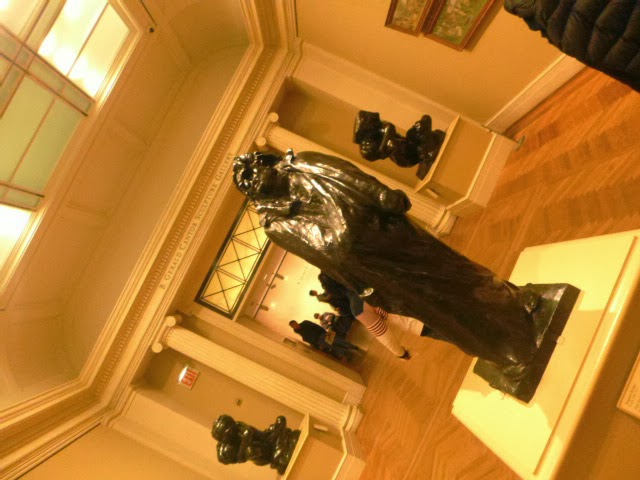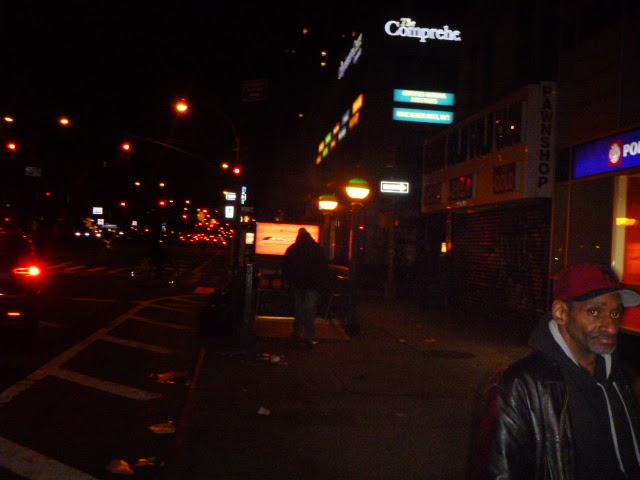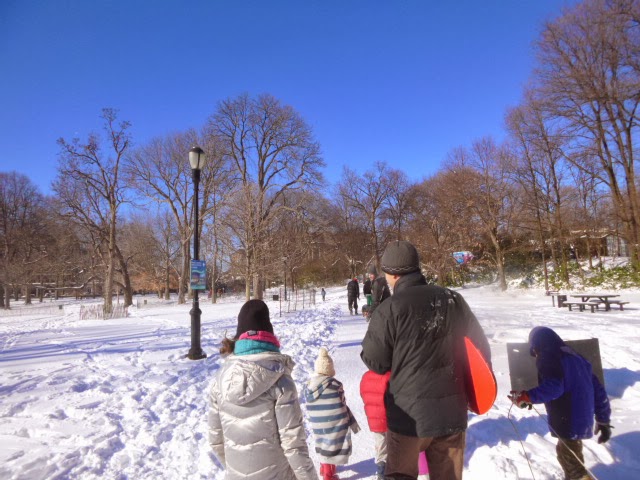 |
| Scenes of family and friends, colors and lights in between, things that came, went, and could have been. |
Holidays reveal as much about our
lives as any time of the year. There are
the reminders about those who’ve passed, as well as the lingering lessons about
our families, lives and struggles to be something different that we were the
years before. In between the excess it is
never easy. Its also funny.
“Ben, I have to tell you something,
the cassoulet
you made was not as good this year as last year’s,” my Mom confessed the
morning I was leaving. She liked the Cooks Illustrated recipe we used the
year before, as opposed to the Jaques Pepin recipe from this year. I am
never as graceful in these moments as I wish I had been.
How do you tell someone who has
entered her daffodils in contests for decades that the process of cooking can more
fun and more important than the outcome, not that Pepin’s cassoulet was any less lovely than
Cooks Illustrated.
But we’d had a blast cooking it. My friend James and his wife dropped by for an afternoon, telling jokes and sipping wine with us all afternoon, as we chopped.
“It’s a Bordeau, a Margaux,” he
guessed in a taste-test arranged by brother.
They’ve lived in Belgium for years
now. A college friend and aspiring snob, James used to
live here, but like so many in recent years, he’s moved to Europe to make a
home for himself.
After the cassoulet and a week with
seven kids, their moms, dads, parents, and grandparents, romping around for the
holiday together, the last night we sat to play game of RISK. The fun of the game between kids and Dads is
really the bonding over history and conflicts over strategy. I
wanted to horse trade properties and territories before the rolling any dice or
moving armies. The kids thought we
should just get to battles. A hundred
years after the outbreak WWI, I argued it might be useful to think about
some other way of playing the game than moving armies. But the kids thought
otherwise. I do wonder if we have ever
taken the time figure out a few of these lessons from the "war to end all wars" of a century prior. All Quiet on the Western
Front was a favorite in high school. The
story of the conflict and the after, generational suicide my Dad calls it, this
woke me up to history in ways few other books ever have. The idea that we all live in the wake of the
trenches helped history feel alive. This was a place where war and its model of authority had been rendered obsolete. Sadly
I’m not quite sure we have learned that.
I first read the story when hanging
out with Dad’s college buddy Fred. “The idea of authority, which they
represented, was associated in our minds
with a greater insight and a manlier wisdom,” noted Remarque.
Everything those soldiers had been brought up to believe disappeared
from the second the first bombs crashed: “The first death we saw shattered this
belief. We had to recognize that our
generation was more to be trusted than theirs.
They surpassed us only in phrases and cleverness.” The first shells in the bunkers disabused
them of any loyalty to that older ideal.
“… and under it the world as they taught it to us broke into
pieces.... And we saw that there was
nothing of their world left. We were all at once terribly alone: and alone
we must see it through” (p.12). Never in
my life had I so closely identified with a text, or with an endeavor of reading
a story with a friend.
 |
| Monument to the Pilgrims, Burgos Spain |
All through the holiday, Will and I
talked about his adventures on the Camino de Santiago, St James way, a hiking
trail and pilgrimage trail he journeyed through the last few summers. We’ll try to go there next summer. Traveling to the Met later in the week with
Mom, we walked to her favorite room in the museum, the Medieval Wing by the
Christmas Tree. I asked Mom about her
favorite things here and she pointed to a statue of St James statues. I have walked by that statue for years now,
never realizing its origins or story. Our
journeys begin in countless unique ways. For us, the way to the Camino begins at the Met.
It was amazing afternoon of
looking at the Venetian glass and the
cathedral of this majestic city and its treasures, as well as villains. Its is
a joy to stare at the colors and the lights, the ways this craft builds on a culture of such innovation and creativity.
The holidays are times to make
plans. They are also times to reconcile
ourselves with unfinished business.
Shortly after Christmas I started
hearing rumblings about the destruction of Boardwalk Community Garden in Coney
Island, taking place when everyone was out of town, just like Chico Mendez garden
years prior. We’ve lost three gardens this year already. I chimed in on facebook.
After a great
holiday, I came up for air to this. At 5am Saturday morning the developer –
iStar – has started to destroy 16 years of community gardening effort.
The Boardwalk Community Garden survived Hurricane Sandy but not the destruction by machines intent on leveling a thriving community garden.
Yesterday they locked the garden. This morning under cover of darkness the developer is moving to take possession.
Christmas is a tough time for gardens.
The Boardwalk Community Garden survived Hurricane Sandy but not the destruction by machines intent on leveling a thriving community garden.
Yesterday they locked the garden. This morning under cover of darkness the developer is moving to take possession.
Christmas is a tough time for gardens.
There
ought to be a law, my brother chimed in. He was right. There ought to be a law. Yet, Melissa
Mark-Viverito, the head of the progressive caucus of New York City Council, is blocking a bill from being introduced that would preserve the community gardens from being introduced. Still the need remains.
Back in town, we ate, cooked paella
and crawfish etouffee, watched movies with friends and welcomed in the New
Year.
The rituals of this time of year are
many. One of my favorites is waking on
New Years and journeying out to the water for a plunge. Riding over to Coney Island I made new
friends on the train. Everyone on our
subway car talked and planned. There is
a joy to seeing so many ragamuffins out making their way, bringing their spirit
of living into the New Year.
One of the last free things in New
York, it is a delight to romp into the water, watching bodies lunge in motion,
shivering and celebrating.
Looking at the crowd, there were some who seemed to adore each other there.
“I used to work at American Express
and got downsized. Now I’m done worrying
about that culture of fear. I just want
to live my life” explained one of my new buddies for the day.
Walking away after my plunge I ran
into the Boardwalk Gardeners, making their way into the water. Aresh and Kate and the Children’s Magical
Garden crew were there. The day before, they issued a press release declaring they would join the plunge.
Boardwalk Community Gardeners sing
"Let It Grow!" at the Coney Island Polar Bear Club New Year's Swim
The
community gardeners of the recently bulldozed Boardwalk Community Garden
stripped down to their skivvies to join the New Year's Polar Bear Swim to raise
awareness of their Coney Island community garden's appeal for justice.
Joined by members of the New York City Community Garden Coalition and the
Coney Island People's Coalition, they held banners and brandished broccoli
stalks as they braved the icy waters. "Oh the pollution out there is
frightful, but the community garden was so delightful. And as long as you
love us so, lettuce grow lettuce grow lettuce grow!" they sang.
"We're
keeping our spirits up, and ready to meet our people's represantatives!"
said Yury Opendik, Boardwalk Community Gardener and now Polar Bear swimmer.
The
community gardeners are asking that the people's incoming Mayor Bill de Blasio,
the new Brooklyn borough president Eric Adams, incoming Councilmember Mark Treyger and other elected officials find a good
solution for their plight. They believe that the bulldozing of the
community garden was illegal and unjust. They say that the community garden was
on public parkland destroyed by a corporation without any input from the
community. The community is seeking a win-win solution to reestablish the
16-year-old garden.
keep
posted on their next action to bring back justice to Coney Island
Finishing the swim, a few of us
converged at our favorite restaurant on Brighten Beach to warm up and enjoy the
day, seeing friends, talking, eating varnishkes.
We walked the board walk, taking in
some of the signs of the times, before rambling out to the Lower East Side for
one of my favorite parties of the year.
Walking through the Lower East Side welcoming the New Year I felt a striking sense of wonder at the battered city, looking at the snow and slush, the people on the streets enjoying where the city has taken me and will take me again.
I thought about the past battles we’ve
been through, the ways some of us have stopped talking and others have moved forward. I wondered which issue to push, while knowing I can’t fight them all. Which
changes are worth embracing and when are they too stupid to stomach – re library
and garden closures. What kind of a city
will this look like in a decade? Will it be under water? And
what is the fight worth taking on? I
thought about the ten years since the city attacked Critical Mass. Good riddance Bloomberg and Ray Kelly for
bringing the Orwellian nightmare of the RNC and subsequent attacks on all our
meeting spots.
Perhaps the longest legacy of the
RNC was the 264 arrests of cyclists for taking part in a group bike ride on August
28, 2004. Over the next year, the NYPD’s Raymond Kelly and Paul Browne would
continue to justify the crackdown with highly inflammatory rhetoric, linking
cycling with anarchism. Kelly would argue that
the Critical Mass ride was "hijacked by groups of cyclists intent on
disruption" in an op-ed article published by the Daily
News on October 28th, 2004 and later in the New York Post on 7/21/2006. Such labels effectively dehumanize those
labeled. Years, later, depositions from a
lawsuit would prove that Raymond Kelly’s allegations against
Critical Mass bicycle riders were made without credible evidence, based on
information from unknown sources and used to rationalize the NYPD’s
multi-million dollar campaign to follow, ticket, and intimidate Critical Mass
bicycle riders every month.
In their
depositions, Kelly could not name a specific source to back up the hijacking
allegation and Browne, who drafted both Op-Eds, could name only one source –
NYPD Transportation Chief Michael Scagnelli. When questioned in his deposition,
Chief Scagnelli admited that he could not recall his sources. Testimony from
officers who were assigned to Critical Mass detail for years directly
contradicted Kelly’s hijack assertions.
“The depositions raise serious and substantial
questions regarding NYPD’s allegation that the Critical Mass ride was ‘hijacked
by cyclists intent on disruption.’ It appears that there is no adequate basis
for this troubling assertion,” says Civil Rights Attorney Norman Siegel.
"We hope that the revealing evidence in these
depositions will be heard by the public, and especially Mayor Bloomberg,"
said Critical Mass cyclist Liane Nikitovich. "Cyclists ask the Mayor to
direct the NYPD to stop the continuous expenditure of precious resources on
controversial practices and over policing and instead work with the cyclists to
return to the more sensible police tactics used prior to the Republican
National Convention."
 |
| Critical Mass then - bike summer 2003 by Peter Meitzler and now, with a zillion cops. In Bloomberg's New York, you had to get permission to meet your friends on a bike ride. |
 |
So
we spent the rest of the break sledding and seeing friends, cooking gumbo and
slowly dipping back into what the year would offer. Go DeBlasio
and Tish James... now its up to us to push them to do the right thing!!! It is up to us to remind them New York has
enough luxury condos, we need more libraries, we need more gardens...and real
public spaces and public commons.
Welcome 2014!






































































































































No comments:
Post a Comment